Tim Atkinson's Blog
June 5, 2023
Britain at its Best: Knaresborough
This piece was supposed to be in the Daily Mail as one of their "Britain at its Best" features. But the commission somehow got overlooked in the confusion of the merger of the Mail and Mail on Sunday and they ended up somehow publishing someone else's piece about this really interesting Yorkshire town. At least, that's what they told me. Still, they paid me for the article , and it's too good (I think) to go to waste so, here it is...
Britain at its Best: Knaresborough
Tim Atkinson goes rowing on the river before testing the health benefits of the local ice-cream
Houses hewn, troglodyte-style, out of rock; an ancient cave with a history of witchcraft and magic; a winding river in a steep, wooded gorge overlooked by the ruins of a Norman castle…. Is this the valley of the Lot or the Dordogne? Or some fairy-tale landscape on the Rhine in Germany? No, it's Knaresborough, North Yorkshire – a hidden gem, filled with history, and beauty.

For a honeypot, it's surprisingly easy (and cheap— £1.80 for a whole day in the Waterside car park) to find a place to park, even in the height of summer. The gorge, up to 120 feet deep and carved into the magnesian limestone and sandstone rock by the River Nidd, is over 16000 years old. It's the reason for Knaresborough's existence, and it's always been important to the town.
On the far bank is Mother Shipton’s Cave, England’s oldest tourist attraction. A walk through the remains of Knaresborough’s Royal Forest leads to the eponymous cave and neighbouring petrifying well. It’s a scene that’s hardly changed in centuries. But across the river this tourist hotspot was once a hive of industry. In the 1800s the river powered mill wheels for flax spinning and Knaresborough became so famous for its linen that it received Royal patronage from Queen Victoria.
In 1851 the railway arrived, connecting the town to Harrogate with a four-arch viaduct of stunning beauty. But the one we walk beneath today - spanning the 200 metre gap with four 57ft arches - is the second to be built. Just days before its official opening in 1848, the first viaduct collapsed, its debris raising the river level by 12 feet and lime from the mortar killing hundreds of fish.
Higher than the viaduct, at the top of the crag, is Knaresborough castle, built by Baron de Burgh as a stamp of Norman authority on land granted by William the Conqueror. King John not only used the castle as a base for hunting expeditions but made the first recorded Royal Maundy presentation here in 1210, giving gifts to thirteen Knaresborough paupers. Captured during the Civil War by Thomas Fairfax, the castle was slighted, leaving only the ruins visible today. The view from the castle, taking in the viaduct, is among the best vistas in the UK. Worth the steep climb, and perfect for pausing and catching your breath.

After all that exercise, we’ve certainly earned an ice-cream. There are plenty of shops to choose from; one has a sign in the window quoting a study by London's Institute of Psychiatry: "just one lick is enough to stimulate the orbitofrontal cortex", it declares, “an area of the brain associated with the pleasures of eating!” We sit and light up our brain’s pleasure zones on a bench in the marketplace, next to a bronze statue of Blind Jack of Knaresborough, complete with trademark 'viameter' or surveyor's wheel. Sightless from the age of six, John Metcalf (to give him his proper name) nevertheless became the "father of modern roads", responsible for building hundreds of miles of well-drained turnpikes the like of which hadn't been seen in Britain since Roman times.

Refreshed and inspired in equal measure, we feel strong enough to track back down the hill, passing the chapel of Our Lady of the Crag, carved into the rock in 1408 by John the Mason as thanks for his young son miraculously dodging a falling boulder. There’s just time for an hour on the river (£25 for a family ticket from Blenkhorns) and, while the kids argue over who should take the oars, we're suddenly stunned by the sparkling green jewel of a Kingfisher flashing past just inches from our boat. It's a breath-taking glimpse that somehow makes the stress of navigating past dozens of other zig-zagging rowers (and a few near misses) all the more worthwhile.

Besides, we’re still on a high from our ice-cream!
May 22, 2023
Migrants, by Eduard Altarriba
I was sent both these books recently by Paul Eckersley, the Publicity Manager at Button Books. He knows that, living where I do, I know a thing or two about explaining migration to children. Not that it should matter where you live. I don't, for instance, live in a war zone. But I still have a duty to explain it to my own and other people's children, from time to time. And the number of migrants in our community has recently been swelled in large numbers by those fleeing war zones in Syria and Ukraine, so... they two are often, inextricably, linked.
I liked both books and can see them being immensely useful in schools and libraries. Our children have got to have the information they need to make sense of the changing world around them and, unfortunately, the examples set by some adults, including those in politics and others with high media profiles, isn't always what we'd wish for. So...
May 19, 2023
JK Rowling Harry Potter Alan Rickman
theebeihfjdbfgskebfisufgizusbfahb f
March 16, 2023
March the Month (in aid of @TPCCUK)
Well, because I know people currently undergoing treatment for prostate cancer, and someone who has just had prostate surgery.
And because prostate cancer is the most commonly diagnosed cancer in the UK, killing one man every 45 minutes. It kills dads, partners, sons, brothers, grandads, uncles and mates.
But it doesn't have to be that way. The funds we're raising money will help fund lifesaving research for men and their families affected by prostate cancer. And 11k steps sounds easy... but I reckon for me, with inflammatory arthritis and all that goes with it, it's the equivalent of the London Marathon!
Here's a link to my JustGiving page: https://marchthemonth.prostatecanceruk.org/fundraising/tims-march-the-month-challenge2023
If you can donate, please do.
And if you already have, thank you!
December 12, 2022
Books of 2022: A Selection
Reading has sometimes been hard this year, for no reason I can put my finger on. I've got into audio books in a big way, and sometimes holding a big hardback (with arthritic fingers) can be hard, but... that's no excuse when you also read (and enjoy reading) on a Kindle. And, of course, my reading - as always - isn't confined to what's just been published. I'm still playing catch-up with books I find, or read about, or hear about, and can't believe I've never read. The Unbearable Lightness of Being was the latest. Unbelievable lack of reading.
However, however, however... The Goodreads review page might be a bit neglected but here, for what it's worth, are some of the books that I've most enjoyed this year:
The Painful Truth: The New Science of Why We Hurt and How We Can Heal, by Monty Lyman (Penguin, Feb. 2022) is one of those books that has a foot in both camps - that of patient and doctor. Lyman is a research fellow at the University of Oxford, and a trained medic. More importantly, he has lived experience of chronic pain having suffered for years from debilitating IBS. Adding clinical validation to his intuitive conclusions on the cause and nature of his own illness leads both to an epiphany, and recovery. Lyman’s book is both a vivid and readable introduction to the latest pain science, and a valuable self-help guide. Knowing why you hurt really can help you feel better!
Beware of the Bull: The Enigmatic Genius of Jake Thackray (Scratching Shed Publishing Ltd 11 Aug. 2022) is the long-awaited biography of the Yorkshire chansonnier by Paul Thompson and John Watterson. Thackray was a song-writing genius. He deserved much wider recognition, and much better than the lonely, alcohol-related death he suffered. This book is a gem, putting the record straight but without pulling any punches. Jake was a complex man: who wouldn't be, given his upbringing, his Catholicism, his demons? The well-spring of true genius is often torment of some kind and the cliché of the sad clown isn't always that wide of the mark. What isn't in any doubt is that Thackray's complex genius is brilliantly served in this very special biography.
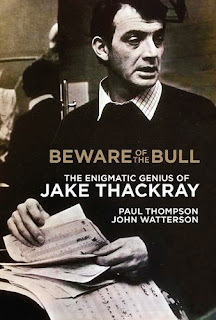
Murder Before Evensong, by Richard Coles is the eponymous priest and former pop-star's first foray into fiction. I'm not a natural crime fiction fan, although I've enjoyed a few of Kate Atkinson's Jackson Brodie books and the odd Val McDermid crime thriller. But I had the great good fortune to host Richard in discussion about his latest book at this year's Boston Book Festival, and read his first venture into the genre as preparation. And a thoroughly enjoyable duty it turned out to be, meeting a colourful cast of characters that includes Stella Harper and Anne Dollinger, the church flower arrangers, local worthy Bernard de Floures and retired headmaster Ned Thwaite all of whom orbit the vicar-cum-detective Daniel Clement and his feisty mother, Audrey. Oh, and there's a loo, too!
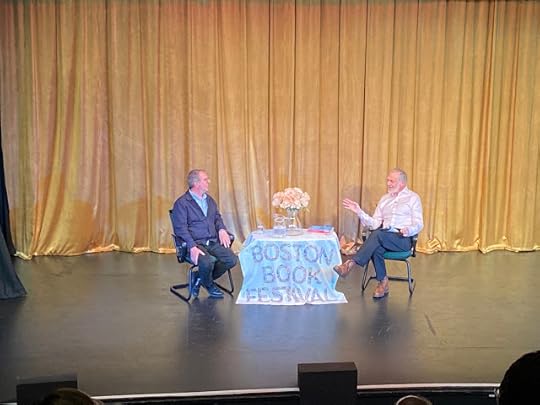
Next up is a children's book. I still sometimes get sent books to review and this one is especially useful to any parent wanting to steer their child through the ever-rougher waters of human social interaction. I mean, is it just me or is everything, these days, freighted with more meaning, more potential pitfalls, more minefields of danger than ever before? I don't long for the old pre-social media days of everything being settled by a playground punch-up. But the invidious, poisonous social media-type pile-ons of today and the way they now seem to taint IRL conversations and relationships is a nest of rattlesnakes. Polite disagreement... is that even possible?
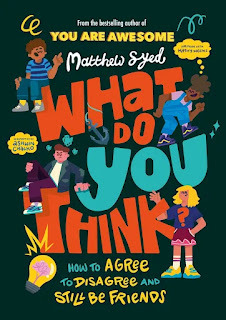
Yes, according to award-winning and bestselling author, Matthew Syed, whose new book helps young readers discover how debates and disagreements can give them new ideas, stronger friendships, and help change the world for the better. What Do YOU Think? (Hachette Children’s Group, Oct. 2022) is a positive and empowering toolkit for kids looking to be heard and understood in an increasingly polarized and argumentative world. It will help them (and help parents, carers and educators supporting them) gain the tools they need to navigate a world that’s increasingly at odds and inspire them to form their own opinions and communicate them with confidence and kindness.
And another one intended for the kids, especially kids in pain, is the latest series from Australian NOI Group entitled Zoe and Zak's Pain Hacks. Written by Dr Joshua W. Pate these colourful and engaging books are a fabulous attempt to share the latest brain-based approaches to pain management with a younger audience. Written in rhyming couplets, the five books are designed to help children, family, friends, teachers and health professionals all learn about pain and help children thrive! There's so much about pain that is downright strange as well as fascinating and knowing just a little bit about your body in this way can be hugely empowering. Niche, maybe - but necessary!
Talking of our amazing brains, July saw the publication of another truly amazing book about them. How the Mind Changed: A Human History of our Evolving Brain by Joseph Jebelli is described as "a seven-million-year journey through our own heads, packed with vivid stories, groundbreaking science, and thrilling surprises... Discover how memory has almost nothing to do with the past," the blurb goes on; "[how] meditation rewires our synapses; magic mushroom use might be responsible for our intelligence; climate accounts for linguistic diversity; and how autism teaches us hugely positive lessons about our past and future." Highly recommended.On the face of it, Muzungu - a memoir by Rod Madocks subtitled 'A Rhodesian Testament' - is a straightforward tale of growing up in Africa as neither Englishman abroad nor true native. But the book is full of surprises. Not least is the fact that Cecil Rhodes himself could be quite the humanist, rather than the cancelled old-colonial he now seems destined forever to be. It's a book full of such apparent contradictions, painting a tender portrait of a lost land of colonial life that could also be nasty, brutish and short (and that's just for the ex-pats - Madock's mother had a penchant for stubbing out her cigarettes on the boy's chest, and he was so brutally beaten at school he still bears both physical and mental scars). Despite everything, and especially its colonial faults, the land of Madock's birth clearly casts a long and lingering shadow over the author's subsequent life.
God: An Anatomy, by Francesca Stavrakopoulou was actually published in hardback last year, but the audiobook only came out in 2022. Actually, although I began by listening, I had to switch to reading the book instead; the author has written a fabulous book... but she isn't (to my ears) its best narrator. Nevertheless, if you want to wrestle with the intellectual muddle of the Western concept of god (or gods) then this is a highly entertaining as well as academically well-argued book. But one to read, rather than listen to. At least, in my opinion!
Why Has Nobody Told Me This Before? by Dr Julie Smith is out in paperback on January 6th 2023, so if you've got some Christmas money left and you need a little help facing the grim remainder of winter, this could be for you. It's therapy as common sense, based on science. No wonder the book is a No 1 Sunday Times Bestseller! Smith draws on years of experience as a clinical psychologist, sharing "secrets from a therapist's toolkit" in order to produce a self-help book with a difference.
Last, but by no means least, Super-Infinite: The Transformations of John Donne by Katherine Rundell was Winner of the Baillie Gifford Prize for Non-Fiction and a worthy winner too. John Donne is a fascinating subject: pirate, law student, prisoner, poet and priest, the Dean of St Paul's didn't do anything by halves. And neither does this excellent biography, which treads the line between telling the story and trying to explain it, not least by reference to the poetry, with deft skill. Whether you like Donne's poetry, or loathe it, you will love this book because the life is fascinating, and the way it's told here is so exciting. As the man himself wrote: "Love's mysteries in souls do grow, But yet the body is his book."
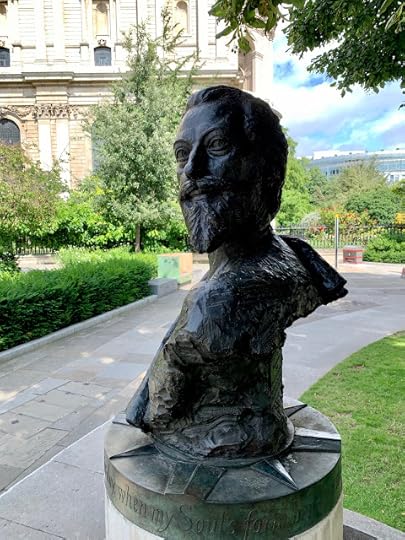
October 11, 2022
Happy birthday Classic FM!
I was a bit of a weird kid. My idea of rebellion wasn't following the herd to the latest trend in pop, rock or punk (though I was nothing if not catholic in my tastes, and still enjoy a bit of the latter!). No, my idea of kicking back involved BBC Radio 3 and classical music. And in those days (early eighties) it was anything but "accessible".
I'm sitting, this evening, listening the Classic FM's thirtieth anniversary concert from the Royal Albert Hall. The Bournemouth Symphony Orchestra are on fine form, soloists (including the amazing Anna Lapwood) too, but... despite the dulcet tones of Zeb Soanes, it's really not my cup-of-tea.
But then, neither is Radio 3, a lot of the time. I can imagine the old presenters of my youth spinning in their graves at the desperate attempts made by the current crop at audience engagement: tweets, email, anything to get in touch. Because if you're in touch, you're... what, exactly?
Trendy?
Well, maybe. But that's not what serious music if for, is it? That's not what BBC Radio 3 should do, surely? No. It should administer the sacerdotal rituals of classical music like a sacrament, with none of the chummy "let us know what you think" nonsense, none of the "join in the game we're playing" justification for taking up airtime. After all, Classic FM is doing that right now. And although Radio 3 has made some welcome changes as a result of the "new", thirty-year-old kid on the block (like poaching Petroc Trelawny) it should never try to be an ad-free version of the same thing.

October 6, 2022
National Poetry Day
Yes, it's here again. But remember, poetry isn't just for one day - it's for everyday, always. I find myself with poems going round my head (or parts of poems) almost constantly and am forever thankful for the few I know by heart. Because they come, unbidden, often when I least expect them, and work a kind of magic that is hard to replicate. They seem to have a life of their own. It's as though they live in my mind, independent of "me", and emerge from the mental shadows to sooth, console and inspire at times of necessity.
Here's one I can just about recite by heart (even though I do have the book as a prompt!) and it's always been one of my favourites, even though the title is simply "Poem XL", which means "Poem 40", from A.E.Housman's lesser-known collection called (prosaically) "Last Poems".
I hope you like it!
September 6, 2022
Back to school...
Back to school, back to work, it's that time of year.
Personally (and following on from my last post on the subject) I'm convinced this is the ONLY way to commute... good for you, good for the environment - win, win!

August 16, 2022
On yer bike...
Cycling. It's the kind of thing you do when you're young, before you learn to drive, when you can't afford a car (or the petrol to power it!)... to say nothing of the insurance, road tax, MoT etc.
Isn't it?
No!
For a start, even those of us (like me) who've been driving for years are finding filling up the car increasingly expensive, to say nothing of the other costs. But can you really, as an adult, swap your car for a bike? What about those hills? Or a head-wind? Imagine turning up to work with your shirt soaked in sweat!
Well, here's the perfect solution. An e-bike. And not any old e-bike, but the beautiful Eskute Polluno. As they say on their website: "With five pedal-assisted speed settings and the 250 Watt Bafang G010 rear electric hub motor, the electric bicycle Polluno can make light work of hills and make easy riding against strong winds. You'll never be out of breath when you arrive at your destination."
What you will be when you arrive, however, is fitter. Power assisted pedalling doesn't mean no pedalling at all. And you'll be doing your bit for the environment, too. The journey of a thousand miles begins with one step, after all. And everyone who cycles instead of driving is reducing air pollution. Little by little. Petit a petit l'oiseau fait son nid, as the French say. Or so a little bird told me!
Anyway, if none of that persuades you, perhaps the fact that they've got £50 at the moment will? Or even £150 if you want to buy 2! I know, expensive, but these bikes really do represent great value for money... as well as huge savings for the environment and your bank balance when compared to the spiralling costs of motoring.
And you're cycling again!
Back in the saddle!
What's not to like?
June 25, 2022
An author's lot...
... a bit like a policeman's, is seldom a happy one.
But being asked to add my bit to a discussion on publishing on BBC Radio 4's Money Box this week set me thinking. As the host, Felicity Hannah said (channelling her inner Steve Harley!) I've "done it all" - trad. publishing, self publishing and crowdfunded publishing. The only thing I haven't done - and which the programme was actually examining - was hybrid or paid-for or 'vanity' publishing. I've not had to pay, directly, to have anything published. Mostly, I've been paid, sometimes up-front. But there was that time I decided to try crowdfunding, and spent a lot of hard yakka trying to raise the upfront costs to have my novel, The Glorious Dead, published. And that, I think, was why I was invited to take part.
But the discussion itself was quite wide-ranging and set me thinking about why, in the broadest sense, I do what I do, which is write. It certainly isn't for the money. As the Society of Authors (whose Chief Exec was also on the programme) points out, 90% of book earnings are earned by the top 10% of authors. I'm definitely in the majority, being one of the 90% who have to fight over the remaining scraps.
Which always seems unfair. There are, after all, plenty of people making money out of authors: agents, publishers, booksellers to name just three. When I successfully crowdfunded The Glorious Dead it ensured that Unbound could pay its staff, maintain its website and cover its many costs, most of which seem stacked up in the debit column of my twice-yearly "royalties" statements!
As yet, I haven't made a penny. But not only did I write the book, I (and it was largely down to me) crowdfunded it, covering all Unbound's production costs and thereby absolving them of the risk normally borne by the publisher. And therein, maybe, lies the rub. Because, having already covered its costs, and without any further vested financial interest, has Unbound really got the incentive to do what traditional publishers (who have taken a financial risk) do, and promote and sell the book?
Don't get me wrong, I don't regret it. As a relative late-starter I was keen to get as much experience of as many different publishing deals as I could, and Unbound has a well-deserved reputation for producing great books. And The Glorious Dead had garnered little interest from mainstream publishers (no surprise, a work of literary fiction by an unknown author) so I knew at the time of writing that the window of opportunity for a book set in the aftermath of World War One was small as the centenary of the Armistice approached. Ideally, it would be published to coincide with the 100th anniversary of when the guns fell silent. Because this is when the work of the novel's characters began.
I decided to crowdfund with Unbound having already supported several of their books. I knew the editorial process was rigorous and that the books they produced were good - both as physical objects and as examples of their craft. I knew next-to-nothing about crowdfunding but reckoned with a bit of hard work (which turned out to be a year of a LOT of very hard work) I stood a pretty decent chance of raising the ten grand that a hardback took to produce. I was also genuinely supportive of a model that took the financial risk out of the publication process, allowing greater editorial (and authorial) freedom by the simple expedient of covering costs in advance. And after that, of course, it was an industry-busting 50-50 profit share of sales.
Or so I thought.
I should explain I've not gone back over my contract with a fine toothed comb or had it scrutinised by the legal department at the Society of Authors. I ought to have done that at the time. But apart from a few typos and the odd grammatical infelicity it read pretty much like the other contracts I had signed. Except, of course, that in this case publication was contingent upon raising upfront the cost of the book's production.
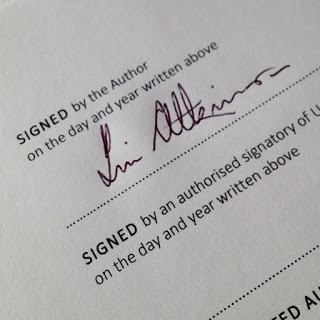
I should point out that it doesn't have to cost ten grand to produce a book. It can be done well for far less. But Unbound weren't cutting any corners and the product would be given lavish amounts of attention for the money I was raising. I should also point out I was delighted with the book. It came out on November 1st 2019, the near-perfect time, and received some praise and a modicum of attention. It appeared in bookshops. It was spotted! Friends kept sending me photos of it on the shelves. One of my own proudest moments was seeing it displayed on the 'Books for Christmas' table in Heffer's, rubbing shoulders with Sally Rooney and Joyce Carol Oates...oh, and Anton du Beke, too (but you can't have everything!).
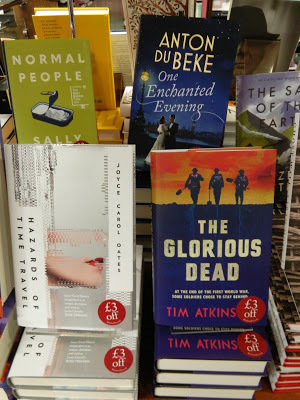
Sales seemed to be going well, I was told. If it wasn't flying off the shelves it was certainly moving, if slowly. I expected nothing from the first statement, but was confident by the second I might have made enough to celebrate with a decent bottle of wine. Since then I've had several more statements. And I'm still waiting for the money to buy a packet of biscuits, let alone a bottle of wine. Because, in spite of raising enough to cover the publication costs, costs keep being added and money earned from sales held back against future loses (such as trade returns). At my lowest ebb it seemed that everything short of the office tea money was being added to the debit column of my statement.
I'm no accountant, obviously. Neither am I a businessman. I might be naive but still, the question nags me: how can a model where the upfront costs are covered in advance produce so little from subsequent sales? Surely each and every sale should, technically, yield a profit? I've gone from being an eager enthusiast for a new model, to a rather impoverished critic. Cynicism has now set and hardened like cement. But it’s not difficult to feel bitter when everyone else, or so it seems, has been paid.
Except me.
Which is why, as the programme seemed to hint, as and Adam Croft - author of the Rutland Crime series confirmed - self-publishing is becoming increasingly popular with authors. Because the antiquated so-called 'industry' that is publishing and selling seems geared up to make money for everyone except the one person without whom it wouldn't exist... unless you happen to be in that happy 10% of authors mentioned earlier.
But things are changing.
And it's refreshing to hear how on programmes like this, which you can do (should you wish) all year!




